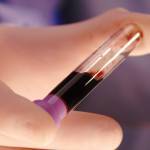Testing for EIA: Every Horse Owner’s Responsibility

Horses infected with equine infectious anemia, or EIA, usually show such mild signs that owners never know their horses are ill. A few infected horses die of the disease, but most seem to recover quickly, though they may have periodic episodes of fever, weight loss, weakness, and other signs. Infected horses can’t spread the disease directly to other horses, and humans are not susceptible to the virus. So why should horse owners care about EIA?
This disease is a matter of concern because of the way it can spread quickly through the horses in a herd or a larger region. The EIA virus is easily picked up from an infected horse by biting flies that go on to infect nearby animals with their next bites. The virus doesn’t live long on the insect’s mouth parts, so infection is spread only between horses that are fairly close together. However, once a horse is infected, the virus lives and reproduces in its body for the rest of its life, so a horse with EIA is a moving reservoir of disease. If this horse is sold to another property, goes to a show or trail ride, or gets new pasturemates, all horses that it comes close to are at immediate risk of getting the disease. Most of the newly infected horses will get mildly sick. Some will die. All will become lifetime carriers of EIA, able to pass the disease on to other horses. So far, there is no cure and no preventive vaccine.
In America, it’s easy to find out if a horse is infected with EIA. A simple and inexpensive blood test, called a Coggins test, can reveal whether a horse is an EIA carrier or is not infected with the disease. A negative Coggins test is required before a horse can enter a show or be transported across state lines. However, there’s still a reason to have horses tested even if the owner never plans to have them leave the farm. Because any horse with EIA is able to send the infection to nearby horses by way of biting insects, knowing every horse’s status is the only way to stop the spread of the disease.
Horses that test positive for EIA leave their owners with one of two options. One choice is to keep any horse with a positive Coggins test isolated from all other uninfected equines for the rest of its life. This means the owner can’t legally get rid of the horse, take it off the property, or bring new horses onto the property. The alternative, which is chosen by many owners, is euthanasia.
Horse owners who have questions about EIA, getting Coggins testing done, or keeping a Coggins-positive horse should contact a veterinarian for more information.








